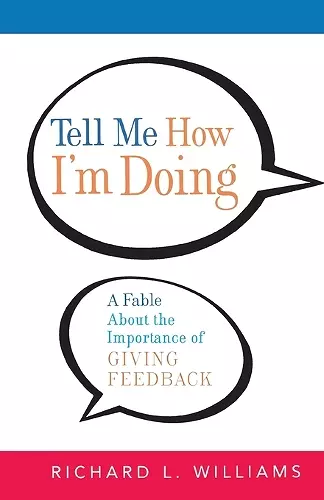Tell Me How I'm Doing
A Fable About the Importance of Giving Feedback
Format:Paperback
Publisher:HarperCollins Focus
Published:24th Apr '18
Currently unavailable, and unfortunately no date known when it will be back

"Just imagine being completely denied any feedback whatsoever -- no guidance, no praise, and no constructive criticism for the things you do. If you received no input at all, how much initiative would you demonstrate? Would your productivity be high, or low? What would your morale be like as time went on? And if you experienced this kind of treatment in the workplace, how likely would you be to turn down a job offer to go somewhere else? The sad fact is that most of us take feedback for granted. But interpersonal feedback is a critical nutrient for everyone, whether at home, at work, or elsewhere -- the psychological equivalent of food and water. Without strong, clear feedback to use as a reference point, people are incapable of functioning fully and productively. Yet as important as it is to let people know how they're doing, most of us lack the skill to consistently deliver good, constructive feedback. Tell Me How I’m Doing illustrates the importance of feedback using a simple fable in which a beleaguered manager recognizes the enormous impact feedback can have in his organization…by experiencing firsthand what it feels like to go without it. The book then provides step-by-step guidance for how you can improve your own ability to relate to the people around you and become more effective in every sphere of your life. The book helps you take a personal inventory of your own feedback style, and introduces you to the four distinct types of feedback -- supportive, corrective, abusive, and insignificant -- and clarifies when to use the first two, and how to avoid the others. You'll also learn about the ten essential dimensions of feedback, including how to: Use a Plan -- Give your feedback some preparatory thought, and then deliver it with a clear solution in mind. Be Specific -- Get your point across by citing particular examples of the behavior you’re discussing. Focus on Behaviors -- Target the factors that can be seen or measured, rather than concentrating on personalities, attitudes, or labels. Determine Time and Place -- Know when and where to give feedback for maximum effect. Give Balanced Feedback -- Provide the right mix of supportive and corrective feedback. By understanding how to interact more...
ISBN: 9780814409305
Dimensions: 216mm x 139mm x 9mm
Weight: 190g
128 pages